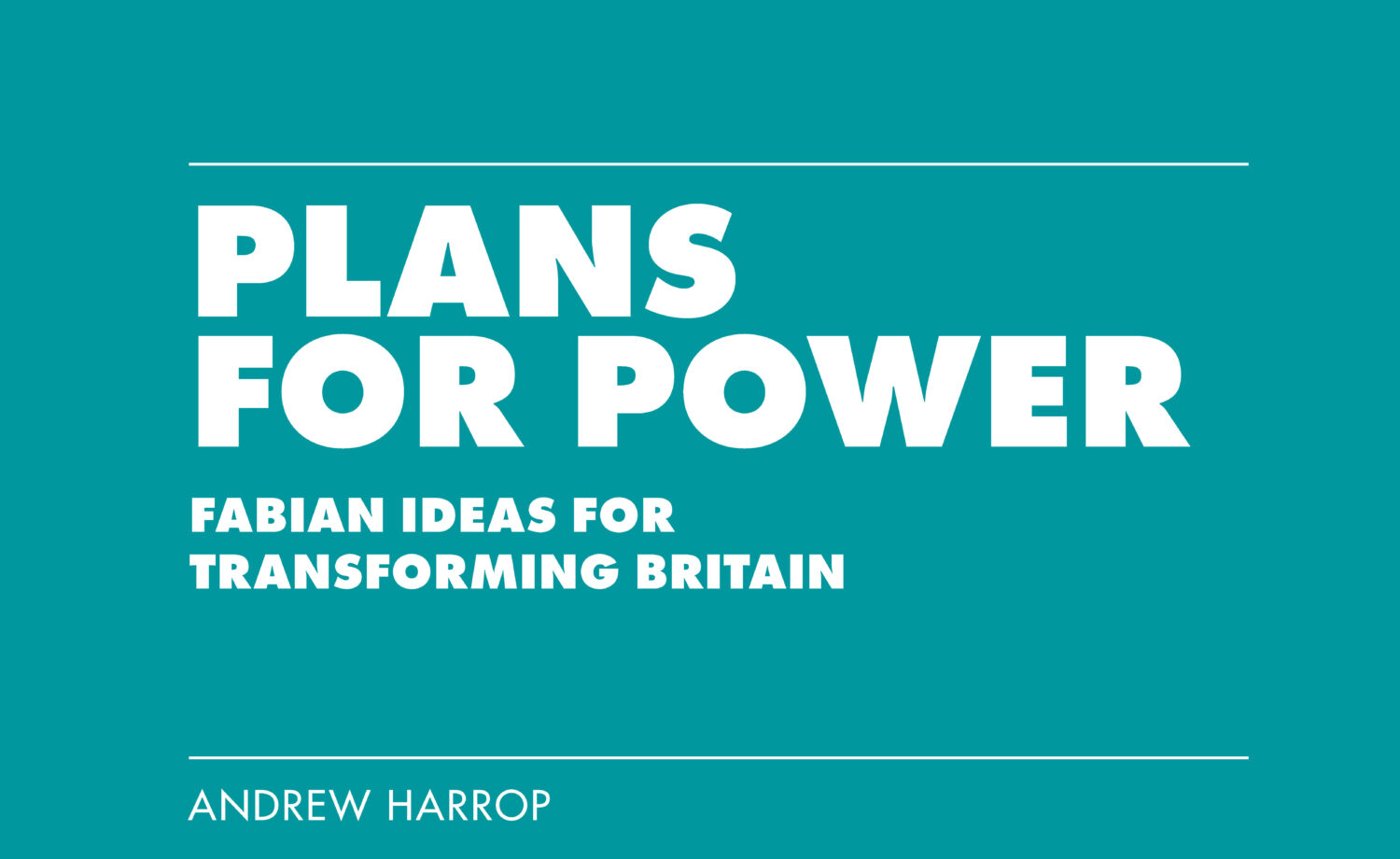New pamphlet: Plans for Power
Our general secretary presents a 'mixtape' of the most important ideas developed and championed by the Fabian Society in recent years
Our new pamphlet Plans for Power: Fabian ideas for transforming Britain is a compilation of the most important ideas developed and championed by the Fabian Society in recent years. Some of the proposals have already been adopted by the Labour party. But we say ‘plans for power’ deliberately because many of the recommendations are things that a new government should do once it has won, not things to put in a manifesto in opposition.
The proposals cover:
- a National Care Service
- early years inequality
- affordable housebuilding
- a commission for living standards
- private pensions reform
- British employment insurance
- employment and trade union rights
- economic devolution in England
- tax reform
- public service reform
- long-termism in the public finances
Two ambitions and ten goals
The core task of government for the next decade should be to deliver two ambitions, ‘good growth’ and ‘good society’. Good growth means significantly and sustainably increasing living standards for everyone, while making rapid progress towards net zero carbon emissions. Good society means transforming the UK into a country that is much healthier, better educated, safer, greener, more caring and nurturing, and more fair, equal, resilient and united.
To achieve these ambitions the next government should set itself a series of goals that it will seek to achieve over 10 years. They should reflect the greatest challenges facing the UK and feel relevant both to the country as a whole and to individual families. We suggest ten possible goals for the next government:
Good growth
- Declining carbon emissions – emissions below one quarter of 1990 levels and net zero electricity.
- Rising living standards – household incomes rising in line with the post-1945 average and catching up with other rich nations.
- Narrowing regional inequality – a measurable fall in geographic gaps in economic output, earnings and household incomes.
- Falling poverty – ending destitution and halving the proportion of people living in poverty.
- More affordable housing – a fall in rents and house prices relative to earnings and a million more homes for subsidised rent.
Good society
- Better health – healthy life expectancy rising in line with the post-1945 average, health inequalities narrowing, better mental health and wellbeing, and restored confidence in the NHS.
- Better educated – a rise in the number of young people and adults acquiring qualifications at every level and much narrower socio-economic attainment gaps.
- Safer – less crime, less fear of crime, less vulnerability to cyber and security threats, and greater confidence in the police and justice system.
- More caring and nurturing – more support and time together for families; high quality, affordable childcare and social care that meets levels of need.
- Fairer and more equal – a fall in inequalities in income, wealth and power; greater social mobility; and institutions built on integrity, openness, fairness and respect.
Key proposals in Plans for Power
The report sets out proposals across 11 chapters for the next government to consider:
Act on early years inequality with a cross-government strategy to reduce inequality among under-fives; comprehensive local early years services; new health and development checks; and 30 hours a week of free childcare for all disadvantaged children aged 9 months to 5 years.
A National Care Service for England based on a new partnership between national government, councils and care providers offering help to everyone who needs assistance, with fair funding, new rights and nationwide terms and conditions for care workers.
A UK living standards commission to advise the government on minimum income adequacy thresholds, poverty reduction targets and strategies for raising living standards, all informed by the perspectives of citizens.
British employment insurance, a new system of income protection to be built over 10 years, with time-limited benefits and statutory pay schemes that replace at least half of people’s usual earnings when they are sick, caring for babies, unemployed or carers.
Good pensions for all with higher minimum employer pension contributions; opt-out pension saving for all workers including the self-employed; and automatic conversion of pension savings into lifelong retirement incomes.
Homes people can afford with more than one third of new homes to be affordable; capital grants to build 90,000 social homes per year; new communities on well-connected green belt land; and councils purchasing private rented homes for social housing.
An agenda for workers and technology with an integrated adult skills system that has an offer for every business and worker; updated rights for technology-enabled work; expanded collective bargaining; and new partnerships between employers and worker representatives.
Economic devolution with every part of England able to take on the powers currently devolved to Greater Manchester and the West Midlands; nationwide bus franchising; fair financing for mayors; local revenue-raising measures; and beefed-up financial accountability.
Stewarding the public finances with an Office for Value for Money; better capital expenditure decisions; improved spending reviews; place-based budgeting and audits; and long-termism in all spending decisions.
Public service reform with public services based on stronger public character and ethos; devolution of trust and power to places, institutions, frontline employees and citizens; and greater performance and value through data, peer-led improvement, early intervention and joined-up provision.
A review of taxation to examine loopholes and tax reliefs; consider whether there is a case to reform taxes on assets, businesses and non-employee income; debate earmarked health taxes; and start to explore long-term integration of social security and personal taxes.
Read Plans for Power: Fabian Ideas for Transforming Britain by Andrew Harrop

